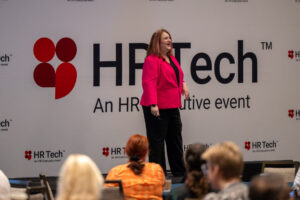As synthetic intelligence dominated conversations at this 12 months’s HR Tech convention, new analysis exhibits a big hole between AI experimentation and formal implementation inside HR processes.
In line with the twenty eighth version of the HR Tech HR Techniques Survey from Sapient Insights Group, 31% of organizations now use AI inside HR processes, up from 24% the earlier 12 months. Nonetheless, a extra placing discovering reveals that 80% of HR professionals use AI instruments personally for work duties, but solely 14% pay for these instruments themselves.
“There’s a distinction between whether or not I’ve embedded it and I’ve constructed a course of round it and different individuals within the group are accessing it versus I’m utilizing my very own model of AI,” stated Stacey Harris, chief analysis officer and managing associate at Sapient Insights Group, in an interview with HR Govt HR Tech Editor Jill Barth at HR Tech.
The survey information exhibits an attention-grabbing shift in how organizations outline AI. Harris famous that firms are transferring away from counting machine studying and predictive analytics as AI adoption, now requiring generative or agentic capabilities to fulfill their definition.
She stated that organizational groups, quite than AI distributors or tech companies, are those reshaping the definition of what counts as AI. Over the previous 12 months, the framing has shifted noticeably.
The sorts of machine studying that main companies relied on, together with predictive analytics, was once described because the core of synthetic intelligence. That view is now not dominant.
Many firms incessantly claimed they had been actively utilizing these AI applied sciences. Harris noticed that whereas this adoption was widespread, it didn’t essentially replicate the total potential of AI.

Nonetheless, it appears that evidently the notion has shifted lately. Now, the prevailing sense amongst these organizations is that true synthetic intelligence should contain one thing extra superior. Particularly, this means some type of generative and agent-like intelligence that may act autonomously and create new content material or options, quite than simply analyzing present information and making predictions.
Be taught extra in regards to the research: Sapient Insights Group’s twenty eighth HR Techniques Survey: High options, tendencies and what’s subsequent
Value turns into the first barrier
For enterprise organizations with greater than 5,000 staff, value has emerged as the highest barrier to AI implementation. This class jumped from 22% citing it as their major concern final 12 months to 44% this 12 months. “They can not afford what’s in entrance of them,” Harris stated.
The survey discovered sturdy resistance to further AI charges, with 57% of respondents bored with paying extra for AI capabilities. Round 40% stated they may take into account extra prices if there have been a transparent and compelling ROI. Solely 5% had been outright prepared to pay further.
HR’s strategic rise
The survey revealed a big leap in how CEOs and board members view HR’s strategic significance, rising from 34% to 54% 12 months over 12 months. Harris attributes this to IT departments gaining newfound respect for HR’s experience in managing unpredictable assets.
“They’ve actually gone by way of an entire 12 months of studying what it’s prefer to handle a useful resource that doesn’t all the time do what you assume it’s going to do,” Harris stated. “HR has been doing this for a very long time.”
Learn extra: What are the important thing findings of the 2025 HR Techniques Survey?
Enterprise priorities driving HR tech choices
Two main forces are shaping enterprise choices: Forty-one % of organizations prioritize income development, whereas 70% deal with optimizing effectivity and decreasing prices. These priorities are bringing HR and finance into nearer collaboration, although not all the time easily.
“HR is getting caught within the center a little bit bit with budgets and who owns what, whether or not the information is effective for AI or is it precious for enterprise outcomes,” Harris stated.
When organizations do implement AI in HR, the worth proposition facilities totally on effectivity positive factors and quicker info entry for managers and executives. Examples embrace extracting info from documentation and databases that had been beforehand tough to entry, notably in advantages administration.
Harris famous that essentially the most transformative functions of generative AI are nonetheless largely unrealized. She emphasised that its true potential lies in aiding individuals, serving to them collaborate extra successfully and assume in new methods. “And I don’t assume we’re there but,” she added.



